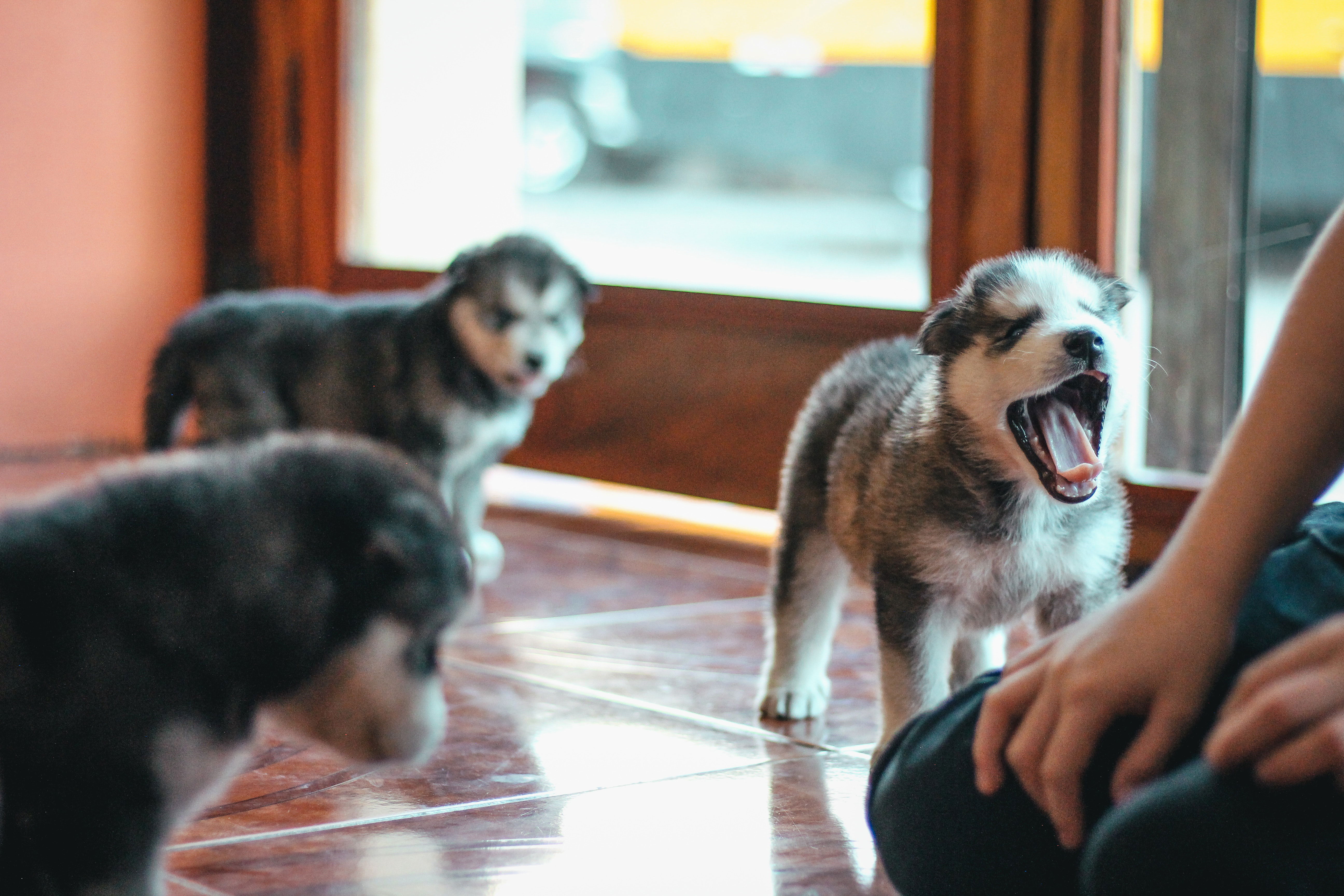Why Do Dogs Bark?
Understanding why your dog barks & what you can do?
Barking is a dog’s natural behaviour and one of their key methods of communication to us. other dogs and even inanimate objects.
Even if we know and understand this, we as humans find barking irritating, annoying or embarrassing. In this blog, we'll delve into the understanding the emotional & environmental to reasons why dogs bark and explore positive ways to manage and reduce excessive barking without compromising their happiness or well-being.
There can be genetic reasons too but these will vary on the individual breeds so we will not go into this in this blog.

Why do Dogs Bark?
The reason dogs bark is communication it is their way of expressing themselves and conveying various emotions to each other, humans which can often include greetings, excitement and seeking attention.
They can also be saying they are unsure when they see, hear new or unknown objects in their current environment.
Dogs communicate with each other in many more subtle ways these can be silent, very quiet or by using their bodies and vocalising by growling or barking which is one of the more noticeable methods they use.
Therefore, unless you learn what these subtle methods of communication mean including body language, touches, or slight glances mean we are often oblivious that your dog not feeling happy until they react by vocalising their feelings and emotions by barking.
They will have tried the other methods and we have either not seen or understood them.
On occasion they may feel they have to quickly escalate a situation by barking either to make whatever they are barking at go away or get our attention so we can help them manage it.
This is particularly evident if your dog is restrained on a lead or constrained in a space where they cannot behave in the manner they would choose to do so if they were free to follow their natural instincts.
This is why understanding why your dog is barking can help you address their needs and emotions more effectively.

Reasons dogs bark:
- Alerting – Most dogs have natural protective instinct, so they may bark to alert us to potential threats or strangers approaching their territory. Which is a good thing if our property of family is in danger. Some breeds though have been specifically bred over many centuries to be used for protection or guarding and these will have a particularly strong instinct.
- Anxiety and Fear - When feeling anxious or scared, dogs have various ways of coping and communication to the subject of their fear. They initially start with non-vocal communication (body language). If the subject of their distress doesn’t understand or is not reading this communication they will escalate to vocalising such as whimpering, growling or barking to ask them go away as it is too close to them. Or they may be asking you to help them especially if they are restrained on a lead or constrained in your house. The subject of their distress can be human, animal or inanimate objects they have not encountered before
- Attention Seeking – Dogs bark at us and other dogs to get attention, this could be for food play or physical attention. They do this because they have tried non-vocal methods such as looking, touching, pawing and have escalated to whimpering or barking to get the attention they want.
- Boredom & Loneliness - Dogs are social animals and can become bored when they lack stimulation, company or are left alone for extended periods. They may bark to try and get the stimulation or company they crave and deserve. Barking is sometimes a symptom of “separation anxiety” which is a severe emotional disorder that requires professional behaviour support
- Excitement – Dogs may bark when they are excited such as when they are having fun playing with you, toys, other dogs or they are fulfilling their natural hunting instincts such as chasing birds or squirrels etc.
Once you understand that barking is a natural behaviour for your dog and it is their way to communicate with you, people, animals, or other things.
You should learn to understand why they are barking which is often when their emotions or their current environment give them no options. So you need to work out what & why they are feeling that way before considering how to address it

Remember when your dog is barking, they are communicating,
it may be to you or something else but as our dogs are living in a world that humans or society has dictated for them, they are unable to or are restrained from behaving is a way they would naturally choose to do.
It is up to us as their guardians & caregivers to listen, understand and change your dog’s emotional state or environment either temporarily or permanently so they do not feel the need to communicate in this way.
Barking is a valid method of communication for a dog and is a natural emotional response to different situations it should not be punished or stopped because we all need to be able to communicate until we are heard.
If your dog is not allowed to be heard it may escalate into other possibly more serious behaviours as emotions get higher.
To reduce unnecessary barking, you need to start by making changes to your dog’s emotional state and or their current environment to ensure that they are not barking due to distress such as pain or other discomfort.
It is important to listen and learn what their different types of barking sound like as they will be telling you different things which may be fear, telling you something, asking for attention or anything else that is important to them.
Each type of bark will be different in every dog, they will have differing tones - sharp or deep, volume - loud or quieter or persistence – single or multiple barks.
How to change your dog’s emotional state or environment to reduce unnecessary barking before enlisting help from a qualified trainer or behaviourist.
- Alerting – Your dog may be barking to tell you of a perceived threat or potential danger They will have a different concept of what is dangerous or threatening. In the house it may be an intruder, delivery person or loud noise such as fireworks. Outside it could be a dog or something else suddenly appearing which startles them. So if they bark you are being told they feel something isn’t right in their mind. If it is an actual "intruder" such as a burglar or delivery person, you should be glad they told you They should be “told” that you are grateful by rewarding them. If it is something else such as a more distantly approaching dog, person, or thing it is probably they are feeling anxious or fearful.
- Anxiety and Fear – If they are barking at a dog, person, or situation that they are scared or worried about. This may be a new environment or dog or person or it may be a situation that has occurred previously, and they have not been able to work through their anxiety or fear so the next time they are in a similar situation they anticipate and bark. If you aware of your dog’s fears and anxieties. If you are aware that your dog responds by barking in particular situations. Initially, if possible, you should try and avoid putting your dog into those situations by avoiding them. If it is new or sudden situation removing your dog from the situation should be your priority.
- Attention Seeking – If your dog barks to get your attention for food, play or fuss or anything else. They have probably tried to get your attention in a more subtle way and you have not acknowledged it so the escalate it until you do and barking often does the job as most people find barking hard to ignore, so they at last get your attention. To avoid the escalation, understand your dog’s ways of getting your attention whether it be a look, a nose nudge, a paw prod, mouthing or nipping, whimpering, jumping up or anything else including barking in your face. You should then decide the behaviour you are happy to reinforce the majority of the times you notice it, such as them looking at you or nudging you gently and be consistent so your dog will offer this behaviour and they will get your attention without is escalating into the more irritating behaviours such as barking.
- Boredom & Loneliness – This is the barking that often affect others as well as you as it often occurs when you are away from your dog, so it is neighbours or family members who are not actively involved in your dog’s care. To alleviate this your dog should be give appropriate exercise and mental stimulation and they should not be left without company for long periods of time. If they show distress when you leave them for even short periods of time this could be a serious disorder such as “separation anxiety” and the assistance of a qualified behaviourist sought.
- Excitement – Dogs bark if they are excited either by interaction or fun with us, other dogs or when chasing squirrels etc. this is totally normal as they are enjoying themselves. But excitement can become over excitement and can quickly turn into behaviours that may not be quite so acceptable such as biting or jumping up. So be aware of the signs and keep periods of excitement to short interludes without it becoming an unwanted behaviour.

So by understanding that dogs bark to communicate with us and others when they are feeling emotionally unsure about people, other dogs, or the environment.
You will be able to help manage and support their emotions in the situations you take them into. Therefore reducing their need to bark so you do not feel you have to correct them.
Correction either verbally or physically when you dog is in an emotional state can often make the behaviour worse.
If your dog is excessively barking and you would like help in understanding why they are and how to reduce any unnecessary barking, consult a professional dog trainer or behaviourist who offers gentle, rewarding & pain free methods for guidance and support.
If you would like personalised advice or help with your puppy or dog.
Contact Gill at Speaking Spaniel
gill@speakingspaniel.co.uk
07595 217299